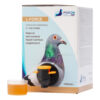Lactic Acid Buildup in Racing Pigeons Indicators and Management Strategies
For pigeon racing enthusiasts, ensuring the optimal health and performance of their birds is paramount. One critical factor that can influence a pigeon’s racing capabilities is the accumulation of lactic acid during intense physical exertion. Understanding the indicators of lactic acid buildup and implementing effective management strategies can significantly enhance your pigeons’ endurance and overall well-being.
What is Lactic Acid?
Lactic acid is a byproduct produced when muscles generate energy anaerobically (without sufficient oxygen). During high-intensity activities, such as racing, pigeons’ muscles may rely on this anaerobic pathway, leading to lactic acid accumulation. While it’s a natural metabolic process, excessive buildup can adversely affect muscle function and overall health.
Indicators of Lactic Acid Buildup in Racing Pigeons
Recognizing the signs of lactic acid accumulation is crucial for timely intervention. Key indicators include:
1. Muscle Fatigue and Weakness
Elevated lactic acid levels can lead to muscle soreness and fatigue, hindering a pigeon’s ability to sustain prolonged flight. This fatigue results from the acid’s interference with normal muscle contractions.
2. Decreased Flight Performance
Pigeons experiencing lactic acid buildup may exhibit reduced speed and endurance during races. They might struggle to maintain their usual pace or complete races they previously managed with ease.
3. Extended Recovery Times
After intense activity, pigeons with significant lactic acid accumulation may require longer periods to recover. This prolonged recovery can affect their readiness for subsequent training sessions or races.
4. Altered Biochemical Markers
Biochemical assessments can reveal elevated levels of enzymes such as creatine kinase (CK), aspartate aminotransferase (AST), and lactate dehydrogenase (LDH) post-race. These elevations indicate muscle strain and are associated with lactic acid buildup. MedCrave Online
The Impact of Lactic Acid on Digestion and Health
Beyond muscle performance, lactic acid plays a role in a pigeon’s digestive health:
-
Gut Microbiome Balance: Lactic acid-producing bacteria contribute to a healthy intestinal environment by inhibiting harmful pathogens.
-
Nutrient Absorption: A balanced gut microbiome, supported by lactic acid bacteria, enhances digestion and nutrient uptake, vital for energy production and overall health.
However, excessive lactic acid due to overexertion can lead to systemic imbalances, affecting not only muscles but also overall physiological functions.
Strategies to Manage Lactic Acid Levels
Implementing effective strategies can help mitigate lactic acid buildup and its associated effects:
1. Tailored Training Programs
Gradually increasing training intensity allows pigeons’ muscles to adapt, enhancing their ability to process and clear lactic acid efficiently.
2. Nutritional Support
Incorporating supplements that aid in lactic acid metabolism can be beneficial:
-
Balanced Diets: Ensuring a diet with appropriate protein levels prevents excessive nitrogen waste, which can burden the kidneys and affect performance.
3. Probiotic Supplementation
Administering probiotics rich in lactic acid bacteria supports a healthy gut microbiome, promoting efficient digestion and overall health.
4. Adequate Rest and Recovery
Providing sufficient rest between training sessions and races allows muscles to recover and lactic acid levels to normalize, preventing chronic fatigue.
The Role of Nutrition in Managing Lactic Acid
Proper nutrition plays a pivotal role in managing lactic acid levels in racing pigeons. By providing balanced diets and targeted supplements, you can help your birds metabolize energy more efficiently and reduce lactic acid buildup.
Essential Nutrients for Energy Metabolism
A well-balanced diet ensures that pigeons have the necessary nutrients to support energy production and muscle function:
-
Carbohydrates: Primary energy sources that fuel muscle activity during flights.
-
Proteins and Amino Acids: Aid in muscle repair and recovery post-exertion.
-
Fats: Provide a concentrated energy source, especially beneficial for long-distance races.
Ensuring the right balance of these nutrients can help optimize energy utilization and minimize lactic acid accumulation.
Supplements to Balance Lactic Acid Levels
Incorporating specific supplements into your pigeons’ diet can further assist in managing lactic acid buildup:
1. Carbo
Carbo is a highly effective supplement designed to improve muscle strength, endurance, and efficiency during periods of intense training and competition. Its unique combination of nutrients has been developed after years of research. Carbo contains the necessary proteins and minerals that are very effective in reducing lactic acid in muscles. The composition consists of glucose polymers, which are the best carbohydrates to increase endurance and improve performance. Carbo also provides important nutrients for the metabolism of carbohydrates. The antioxidants in this pigeon nutrition product are vitamin C, vitamin E, and vitamin A, which are essential in avoiding the reduction of certain muscle groups. The superiority of Carbo is derived from its optimal balance in carbohydrates, electrolytes, and anti-catabolic proteins. It contains the perfect blend to refill depleted reserves. Carbo’s scientifically developed formula prevents muscle fatigue and muscle catabolism. It serves your racing pigeons well, all year long.
Instructions for Use:
-
Racing season: 3 times per week Pigeon Supplements
-
Before & after racing season: 1 time per week
-
Breeding & moulting season: 3 times per week
Dosage:
Mix 1 to 2 level measures of Carbo with 1kg feed or 1L water. Do not exceed the stated recommended daily dose. Complementary nutrition should not be used as a substitute for a varied diet.
Composition:
Nutrition: Maltodextrine, Fructose, Natriumchloride, Kaliumchloride, Magnesium carbonate
Additives per kg: Vitamin E, D-alpha-tocoferol: 1333.33 mg per kg, Vitamin A retinol: 35533 I.U per kg
Analytical components and qualities: crude protein: 12.0%, free fat: 0.0%, dietary fat: 0.1%, crude ashes: 0.43%, natrium: 0.206%, lysine: 1%, methionine: 1%
All “Pigeon Health & Performance” products are freely available on the market and approved by a recognized European institution.
2. Recup Fast
Recup Fast is designed to help pigeons recover quickly after races. It contains a revolutionary blend of proteins, which are accessed when glycogen reserves are depleted. This nutrition supplement immediately restores the vital reserves, stimulates the development of ultra-strong muscles, and maximizes performance of the pigeon. The high-quality proteins in Recup Fast are absorbed very quickly by the pigeon’s muscles. Of all high-quality proteins, almost 70% immediately penetrates the muscle tissue. These proteins reduce catabolism in the muscles, which is an important benefit during a long-distance race. The unique formula of Recup Fast contains a maximum amount of carbohydrates in order to improve performance during the competition season. It accelerates the restoration of muscle tissue and restores the nitrogen balance. Recup Fast is the most complete solution to be used after an intense flight in order to ensure a maximum and rapid recovery of your racing pigeons.
Instructions for Use:
-
Immediately upon arrival after the race
-
After heavy exertion or during recovery
-
After the last training,
Monitoring Pigeon Health
Regular observation and health assessments are vital. Monitoring behavioral changes, flight performance, and conducting periodic biochemical tests can help detect early signs of lactic acid buildup. Collaborating with avian veterinarians ensures that any health concerns are promptly addressed.
Conclusion
Understanding the indicators of lactic acid buildup in racing pigeons is essential for maintaining their health and optimizing performance. By recognizing signs such as muscle fatigue, decreased flight performance, and extended recovery times, and implementing strategies like tailored training, proper nutrition, and adequate rest, pigeon enthusiasts can effectively manage lactic acid levels. These efforts contribute to enhanced endurance, reduced fatigue, and improved racing outcomes. Investing in comprehensive care strategies ensures that your pigeons remain healthy, resilient, and ready to excel in their racing endeavors.


